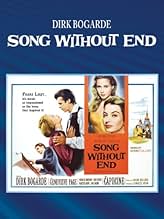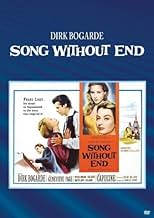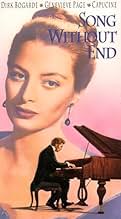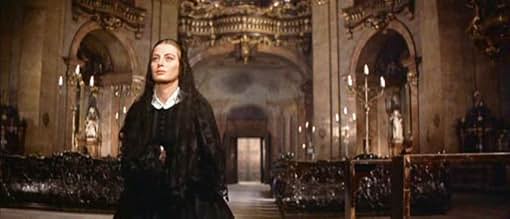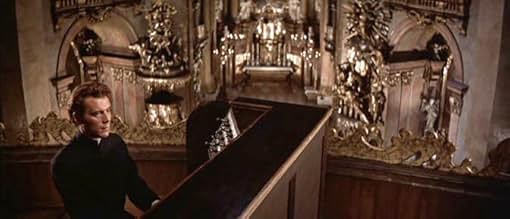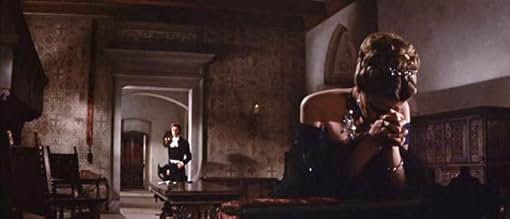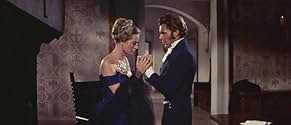Agrega una trama en tu idiomaThe romantic story of Hungarian pianist Franz Liszt (Sir Dirk Bogarde), whose scandalous love affair forced him to abandon his adoring audiences.The romantic story of Hungarian pianist Franz Liszt (Sir Dirk Bogarde), whose scandalous love affair forced him to abandon his adoring audiences.The romantic story of Hungarian pianist Franz Liszt (Sir Dirk Bogarde), whose scandalous love affair forced him to abandon his adoring audiences.
- Dirección
- Guionistas
- Elenco
- Ganó 1 premio Óscar
- 2 premios ganados y 3 nominaciones en total
- Thalberg
- (as E. Erlandsen)
- Chopin
- (as Alex Davion)
- Emissary
- (escenas eliminadas)
- Audience Member
- (sin créditos)
- Komparsenrolle
- (sin créditos)
- Dirección
- Guionistas
- Todo el elenco y el equipo
- Producción, taquilla y más en IMDbPro
Opiniones destacadas
What the movie is, which will polarize viewers, is a thorough opportunity to experience music by great composers as they might in the mid-1800s. No less than 40 musical interludes occur, and unlike today's music biopics, these are not small moments, they nearly all play uninterrupted! This makes for a bloated runtime well over 2 hours, but a rare immersive opportunity to sit and listen to an actor portraying a master performer/composer as a recreation of their era. Read the reviews on IMDb and you'll see viewers either hate this or love this depending on their passion for the music itself. And the movie feels to be 70% concerts, which makes an inevitably weary experience that sacrifices a more deft plot.
Peculiarly, the movie features startlingly low percentage music by Liszt himself. It is a well done plot point that Liszt was a champion of his peers, and helped Chopin, Wagner, and others reach fame they wouldn't have without a master performer like Liszt showcasing their work. But this is intentional to the story. The finest example is a scene where Liszt is playing Chopin on the piano in the background, while Chopin's lover and Liszt's lover discuss their merits as composers vs. performers in the front of the scene. Cinematic subtext to perfection. The Liszt inner debate of whether he was a superior composer or performer is a major plot point. I love these components of the plot, for they shed light on who Liszt was in a way that a Wikipedia article never could. And yet, they're overshadowed by the main draw.
The main story is about Liszt's multiple lovers and the challenging decisions that come with this. It's 1960, so discussion of love, sex, and marriage is very reserved. Only 15 years later, Lisztomania has Roger Daltery playing Liszt as a sex-fueled rocker; this one makes his romances a true conflict of faith. It's great material, but definitely dated in its more calm approach.
Director Charles Vidor died early into production, and was replaced by legendary director George Cukor, who it appears was determined to stay within Vidor's vision of a music biography. The result is something slightly authorless: it's a grand period epic, with little outstanding choices, give or a take a few cool shots. If this were released today, it would get roasted for being thin on story and heavy on music sequences without enough subtext behind them.
The film is shot in Cinemascope but the DVD version I have is shoddy at best. This is a perfect example of an old movie that may get forgotten by time and will not get the 4K restoration reserved for classics such as Gone With the Wind, or Criterion essentials of the highest caliber. Makes you wonder what movies will disappear in time. Had I not been studying the work of Chopin & Liszt, I would have never watched this, especially given it wasn't well reviewed to begin with. And yet, despite its flaws, there is plenty to glean from it, mostly for classical piano buffs, but perhaps for others as well.
(Side note: I do wish I could access a list of all the names of the pieces, they don't always make an effort to tell you what is what. It isn't mentioned in the film, though I learned in my own research, that Liszt's championing of Beethoven, the equivalent of a celebrity endorsing an under-appreciated artist today, is what has elevated Beethoven to superstardom. That could be a movie in of itself)
A Liszt concert back then if played for a mass audience was something like the reception that Elvis and The Beatles got back in their day. It aroused the jealousy of a lot of Liszt's contemporaries, but they respected his talent.
Dirk Bogarde is a capable and charismatic Liszt who had a weakness for married women. He ran off with one and had a couple of kids by her and then seduces a royal countess. The two women in question are played by Genevieve Page and Capucine.
Dirk and Cappy have a whole lot of hurdles to overcome before they can be happy, put there by the Romanov family and the Catholic Church, but it does sort of work itself out in the end.
My favorite performance in the film is that of Martita Hunt who plays a dowager German princess who offers Liszt employment when he needs it.
The film only covers a small portion of Franz Liszt's life, still it's a worthwhile biographical study.
The set decorations here are phenomenal, they're on par with the great 1944 film "Wilson."
The music is magnificent although we could have done without knowing about the friendship between Liszt and the anti-Semite Richard Wagner. Another flaw is the miscasting of Lou Jacobi as Bogarde's manager. Jacobi sounded like he came out of the Catskills. This film for Jacobi came after his super performance, the year before, in the beloved "The Diary of Anne Frank." (Happy Birthday Lou as you turn 95 on Dec. 28th.)
The first part of the film deals with Liszt's career. His playing in concerts in various European countries was remarkable. The second part deals with his ill-fated love with the Countess Cathryne of Lichtenstein.
While we see that Liszt entered the priesthood when his proposed marriage to Cathryne was rejected, we really can't tell if Cathryne became a nun. I imagine no since she was still technically married in the eyes of the church. Nonetheless, we have a powerful, beautifully acted film. Too bad that Totentanz, a Liszt masterpiece, was not played here. I had to know that piece of grand music in a required music course at college. Like the movie, Totentanz was a masterful piece.
I was expecting a comprehensive presentation of Liszt in a film devoted to his life and creative work. Less of interest were works by Bach, Beethoven, Mozart and others. The results looks like the film makers may have lacked complete confidence that a movie featuring compositions exclusively by Liszt would be that attractive to viewers.
In the event that's the case, it's no wonder the critical and public rating of this film is less than excellent. What's notable about it is the exquisite piano performance of Jorge Bolet on the soundtrack, the rich cinematography of James Wong Howe, and the flavorful performances by a talented cast headed by Dirk Bogarde.
¿Sabías que…?
- TriviaCharles Vidor had completed about 15 percent of this movie when he died of a heart attack on June 4, 1959. Sir Dirk Bogarde later recalled that he was "secretly relieved" by Vidor's death, since he and his co-star, Capucine had been treated badly by the short-tempered director. Vidor would often scream at Capucine to relax, and at one point, Bogarde recalled, "shook her like a dead cat." Vidor was replaced by George Cukor, who got along much better with his stars, and was more of an "actor's director."
- ErroresGrand Duchess make reference to "Ukraine" in one scene. The term was not in wide use in the 1840s, especially not among Russian nobility.
- Citas
Countess Marie: I met Franz at a musical party. I remember he played a ballade in A-flat major by Chopin. I thought I'd never seen anything as beautiful as Franz looked when he sat at the piano. I... I wanted to cry. He watched me as he played; Franz never fails to notice a pretty woman in his audience. Afterward, he followed me into the hall. I remember he said, "May I escort you somewhere, madame?" And I said, "Yes." And he said, "Where?" And I said, "Paradise." He didn't smile - he said, "I'll call a carriage."
Princess Carolyne: Did he?
Countess Marie: What?
Princess Carolyne: Drive you there - to paradise?
Countess Marie: [a pause, and a meaningful look as she turns to leave the room] He doesn't know the road, madame.
- ConexionesFeatured in Film Profile: Dirk Bogarde (1961)
Selecciones populares
- How long is Song Without End?Con tecnología de Alexa
Detalles
- Tiempo de ejecución2 horas 21 minutos
- Relación de aspecto
- 2.35 : 1
Contribuir a esta página



